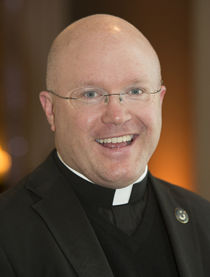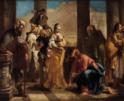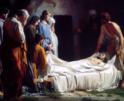
Faith
After the Congress, the Revival has entered a "missionary phase" in which each Catholic in the country is being asked to "walk with one" person who is presently not journeying with the Eucharistic Lord and his Church to Mass and in daily life.

Landry
The National Eucharistic Pilgrimage and the National Eucharistic Congress were the two most spectacular components of the ongoing three-year-plus National Eucharistic Revival, meant to catalyze greater Eucharistic knowledge, faith, gratitude, amazement, love, and life among Catholics in the United States.
The 65-day Eucharistic Pilgrimage, a four-part Eucharistic procession from the Atlantic, Pacific, north, and south making a cross over the country converging in Indianapolis, was a first in any country in the history of the Church.
It cumulatively drew hundreds of thousands to meet Jesus in the Eucharist in churches, on streets, boats, bridges and highways, in prisons, schools and nursing homes, and put into relief the dynamic, pilgrim nature of the Church, walking with and following Jesus each day as the Eucharistic Good Shepherd seeks to lead his flock to the eternal sheepfold.
The five-day Eucharistic Congress was the first such national Eucharistic celebration in 83 years. It brought together over 50,000 Catholics to rejoice in the ongoing incarnate self-gift of Jesus Christ in sacramental form, to adore him, receive him, exalt him, get to know and appreciate him better, and learn more effectively how to share him with others.
Both the Pilgrimage and the Congress were noteworthy and newsworthy occasions, truly spectacular manifestations of the Church's Eucharistic faith. But these extraordinary forms are meant to point us all to their ordinary expressions.
The word "congress" comes from a Latin word for "walking together," and indicates the way Christians each Sunday, indeed every day, come together to worship the Lord. The word for Church in Greek -- "ekklesia" -- refers to how believers have been called together out of their surrounding environments in order to worship as one.
The Church, in effect, is a congress, and we show that congressional reality best when we convene around the altar to meet, listen to, lovingly adore, humbly receive and commit to announce the Eucharistic Lord Jesus.
That daily Eucharistic congress is meant to flow from and lead to the perpetual pilgrimage of the Church through time as Catholics structure their daily life in communion with the Lord who accompanies and guides them. In the holy Eucharist the same Jesus who was within Mary's womb, whom St. Joseph held in his strong arms, who traveled with the Holy Family on pilgrimage to Jerusalem, who crisscrossed the ancient Holy Land with the disciples and apostles and who has gone ahead of us to the Father's house, journeys with us.
He just looks different, in his doubly-miraculous sacramental appearance in which he changes the substance of the bread and wine totally into himself and, lest we be disgusted by feeding on obviously human flesh and blood, conceals himself under the appearances of human food even though after the consecration no bread or wine remains.
Christian life is, therefore, meant to be a continuous upward spiral between the Eucharistic congress that takes at the altar and the Eucharistic pilgrimage we make uniting all aspects of our daily existence to God-with-us-still-with-us. That Eucharistic awareness and vitality is what the National Eucharistic Revival is seeking to revivify within believers as it equips and emboldens them to help others to learn and live.
After the Congress, the Revival has entered a "missionary phase" in which each Catholic in the country is being asked to "walk with one" person who is presently not journeying with the Eucharistic Lord and his Church to Mass and in daily life.
Surveys show that on any given Sunday five of six Catholics in the United States are prioritizing something other than the Eucharistic Lord on the Lord's Day.
These fallen away Catholics are the lost sheep of our families and the family of the Church and each of us is being asked by the Church not merely to invite them back, but like Christ did on the road to Emmaus, to enter into conversation with them, to try to warm their hearts with the light of revelation, and to try to be Christ's instruments to help them invite him to stay with them and to recognize him, as the two disciples did after the Resurrection, in the "breaking of the bread."
This missionary dimension of the Eucharistic Revival was what was emphasized at the closing Mass of the Congress by Pope Francis' legate, Cardinal Luis Antonio Tagle, the head of the Vatican's Dicastery for Evangelization. The Filipino native is recognized as one of the greatest preachers in the English-speaking world and he did not disappoint in Indianapolis.
In his homily, he focused on "Eucharistic conversion" as "missionary conversion." Eucharistic conversion, to turn back fully to Jesus in the Eucharist, was the message, he said, Pope Francis asked him to share with everyone. The theme of the National Eucharistic Congress, Cardinal Tagle said, was "my flesh for the life of the world" (Jn 6:51) and illustrates, he underlined, that Jesus was sent by God the Father to give us the Eucharist; in him mission and gift are united.
In us, Eucharist and evangelization are meant to be united, too.
Tagle proclaimed, "Jesus says, 'I came down from Heaven not to do my will but the will of the One who sent me.' Jesus is sent to be given by the Father to others. He is sent to be a gift . . . The missionary is a gift. Mission is not just about work but also about the gift of oneself. Jesus fulfills his mission by giving himself, his flesh, his presence, to others as the Father wills it . . . Jesus' mission and gift-of-self meet in the Eucharist."
He continued, "Where there is a lack or a weak in of missionary zeal, maybe it is partly due to a weakening in the appreciation of gifts and giftedness. . . . Those who do not see gifts in themselves and in others will not give gifts. They will not go on a mission." He asked whether husbands and wives see each other as gifts or problems; whether children see their parents as gifts of ATM cards; whether parents see children as gifts or burdens; whether priests and deacons see their bishops, religious see their superiors, whether all of us see the poor, homeless and sick and those who are different as gifts.
To see ourselves and others as gifts, he continued, and to live out of Christian mission, we must regard the Eucharistic Jesus as a gift. Many, he stated, see the Eucharistic Jesus as a problem. In John 6, when Jesus declared that he is the Bread of Life and that we need to eat his flesh and drink his blood, many of his disciples responded aloud by saying the teaching was hard and wondering who could accept it. Many, as St. John said, returned to their former way of life and no longer walked with Jesus.
Cardinal Tagle noted, sadly, "they returned to a way of life without Jesus. They chose his absence rather than his presence in their lives. Instead of accompanying him, they walked alone. Their rejection of the gift of Jesus' word, Body and Blood meant they would not walk with him and neither could he send them on mission."
Tagle then focused on what happened after many of the disciples had left Jesus. Jess asked the twelve apostles whether they, too, wanted to leave. Simon Peter replied, "Master, to whom shall we go? You have the words of eternal life. We have come to believe and are convinced that you are the Holy One of God."
Cardinal Tagle commented, "Jesus is asking each one of us, 'Do you also want to leave me?' Like the others, I hope we can answer like Peter: 'We will stay with you, Lord! We refuse to live far from your presence!'"
He stressed, "Those who choose to stay with Jesus will be sent by Jesus. The gift of his presence and love for us will be our gift to people. We should not keep Jesus to ourselves. That is not discipleship. That is selfishness. The gift we have received, we should give as a gift."
He cited Pope Francis' letter to the Congress, which he said expressed the hope "that the participants of the Congress, fully aware of the universal gifts they receive from Heavenly food, may impart them to others."
He summarized, "A Eucharistic people is a missionary and evangelizing people. . . . When the priest or deacon says, 'The Mass is ended, go in the Peace of Christ,' please go! . . . What you have heard, touched, and tasted, you must share with others. We have received the gift of Jesus! Let us go to proclaim Jesus zealously and joyfully for the life of the world!"
That is the way we are all called to live out the Revival.
We are on a mission to have people join us on the Eucharistic pilgrimage of earthly life and at the Sabbatine or daily Eucharistic Congress around the altar.
- Father Landry is a priest of the Diocese of Fall River who is national chaplain to Aid to the Church in Need USA, a Papal Missionary of Mercy and a Missionary of the Eucharist for the US Bishops.
Recent articles in the Faith & Family section
-
Scripture Reflection for April 6, 2025, Fifth Sunday of LentFather Joshua J. Whitfield
-
Are there any saints who had a difficult relationship with the church?Jenna Marie Cooper
-
Holy Thursday and Good FridayFather Robert M. O'Grady
-
Faith is a verbArchbishop Richard G. Henning
-
Giving Mothers and Babies a Chance in the MissionsMaureen Crowley Heil























